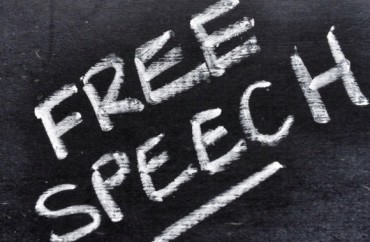
A First Amendment case centered around a Georgia high school freshman can continue, as a federal judge refused a motion to dismiss it on Monday.
Chamblee Charter High School student Keegan Brooks and his father Russell filed a civil suit against the Dekalb County School District, Chamblee principal Rebecca Braaten, and Chamblee assistant principal Clifton Spears for “unconstitutionally punish[ing]” Keegan for his political viewpoint.
At issue: Stickers created by the younger Brooks and distributed to students calling for Principal Braaten to be fired. Braaten had had a rough, and short, tenure at Chamblee; she was accused by many in the community of ruling through “intimidation and fear.” Problems during her reign began “almost immediately” which led to parents starting a petition to have her canned.
Brooks was suspended for wearing one of the stickers and warned he’d continue to be suspended if he kept displaying it, according to his lawyer Gerry Weber. Brooks had given out “less than three dozen” of the stickers to other students to put on their bookbags and cell phones.
As you might expect, the school’s position is that the stickers disrupted the educational environment: They violated school rules on “disrespectfulness” and “creating a disturbance,” according to Judge Mark Cohen of the U.S. District Court for the Northern District of Georgia.
Weber disagrees, saying “This is a case that is [at] the heart of student free speech […] It is a student who is expressing a political opinion in a non-verbal way, with no disruption. And there’s no claim that he’s anything but respectful in the presentation of his views.” At least one teacher backs this up, saying students with the stickers “did not disrupt class or in any way impede learning,” were “respectful,” and removed the stickers when asked to do so.
The school counters that the stickers are a “disparaging joke about [the] school’s principal,” “blatantly hostile toward school leadership,” and are focused on “undermining” Braaten’s authority. It argued that “[c]onsistent with Tinker’s protective rationale and Fraser’s civility considerations, schools may discipline students for insubordination and open displays of disrespect or contempt for school employees.”
Eugene Volokh notes Cohen shot that argument down:
[T]he Bethel School District v. Fraser exception applied only to vulgar speech, and not to all expression of “disrespect or contempt for school employees,” and (2) the Tinker exception applied only when there was a real showing of likely substantial disruption—such disruption can’t categorically be assumed just because speech calls for a principal to be fired.
Based on all this, one may think Brooks is sitting pretty. Don’t count on it. Consider similar cases, arguably more head-scratching than Brooks’s, which upheld the school’s position: For instance, the US Supreme Court refused an appeal from a group of California high school students who were disciplined for wearing shirts donned with American flags on Cinco de Mayo. The court did not explain its ruling, but the LA Times rightly noted it was seen “as strengthening the authority of school officials to suppress the display of clothing or other symbols that might trigger trouble” (emphasis added).
Remember, too, the so-called “Bong hits 4 Jesus” and Hazelwood cases, both which controversially restricted high school students’ First Amendment rights contrary to Tinker.
Fortunately, I had worked with teachers and administrators who knew the law … or if they were uncertain sought out (the hopefully-correct) advice. One moment of controversy at my school involved the beginning of the Iraq War where numerous students donned homemade buttons opposing the US action. The buttons generated much discussion among students, most of it civil and informative. Civics teachers took productive advantage of this. Some students were told by administrators that wearing the buttons was permissible, but that any chanting, singing, or “getting in the face” of pro-war students would not be tolerated.
MORE: US Supreme Court upholds American flag ban at school
MORE: Superintendent apologizes for ‘Trump’ banner at HS football game
IMAGE: Shutterstock.com
Like The College Fix on Facebook / Follow us on Twitter






Please join the conversation about our stories on Facebook, Twitter, Instagram, Reddit, MeWe, Rumble, Gab, Minds and Gettr.